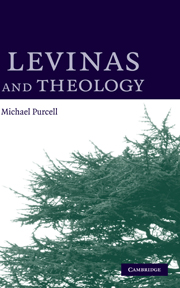Book contents
- Frontmatter
- Contents
- List of abbreviations of Levinas' works
- Introduction
- 1 Levinas, phenomenology, and theology
- 2 Ethics, theology, and the question of God
- 3 Incarnate existence
- 4 Existence as transcendence, or the call of the infinite: towards a theology of grace
- 5 The economy and language of grace: grace, desire, and the awakening of the subject
- 6 The liturgical orientation of the self
- 7 Eucharistic responsibility and working for justice
- Notes
- Select bibliography
- Index
5 - The economy and language of grace: grace, desire, and the awakening of the subject
Published online by Cambridge University Press: 08 January 2010
- Frontmatter
- Contents
- List of abbreviations of Levinas' works
- Introduction
- 1 Levinas, phenomenology, and theology
- 2 Ethics, theology, and the question of God
- 3 Incarnate existence
- 4 Existence as transcendence, or the call of the infinite: towards a theology of grace
- 5 The economy and language of grace: grace, desire, and the awakening of the subject
- 6 The liturgical orientation of the self
- 7 Eucharistic responsibility and working for justice
- Notes
- Select bibliography
- Index
Summary
For Levinas, the constitution of subjectivity as response and responsibility is a key concern. Subjectivity is phenomenologically reduced to intersubjectivity. The subject is both aroused and awoken by the other person who is discovered lately on reflection as always and already having been there. The advent of the other is disturbing, challenging, appealing. The advent of the other is the proximate and prevenient cause of my emergence into ethical humanity, and will become a summons to both responsibility and justice. But, this happens ‘in-the-world’. Although the ‘true life may be elsewhere’, ‘we are in the world’. For Levinas, the ethical redemption of humanity is situated here and now. Thus Levinas commits to enfleshment or incarnation, but understood as an individual responsibility which needs to be worked out justly. ‘The flesh is the hinge of salvation [Caro cardo salutis]’. The world is a corporate undertaking which involves others.
The notion of incarnation is a key Christian doctrine, and its meaning much disputed in the development of theology. How do the divine and the human come together in concert and speak with one voice? Is it possible to begin to think of an incarnation which neither compromises the transcendence of God nor removes responsibility for the other person and a commitment to justice and a just society to another world yet to come, but rather returns responsibility and justice to the world in which ‘we live and move and have our being’.
- Type
- Chapter
- Information
- Levinas and Theology , pp. 110 - 134Publisher: Cambridge University PressPrint publication year: 2006



